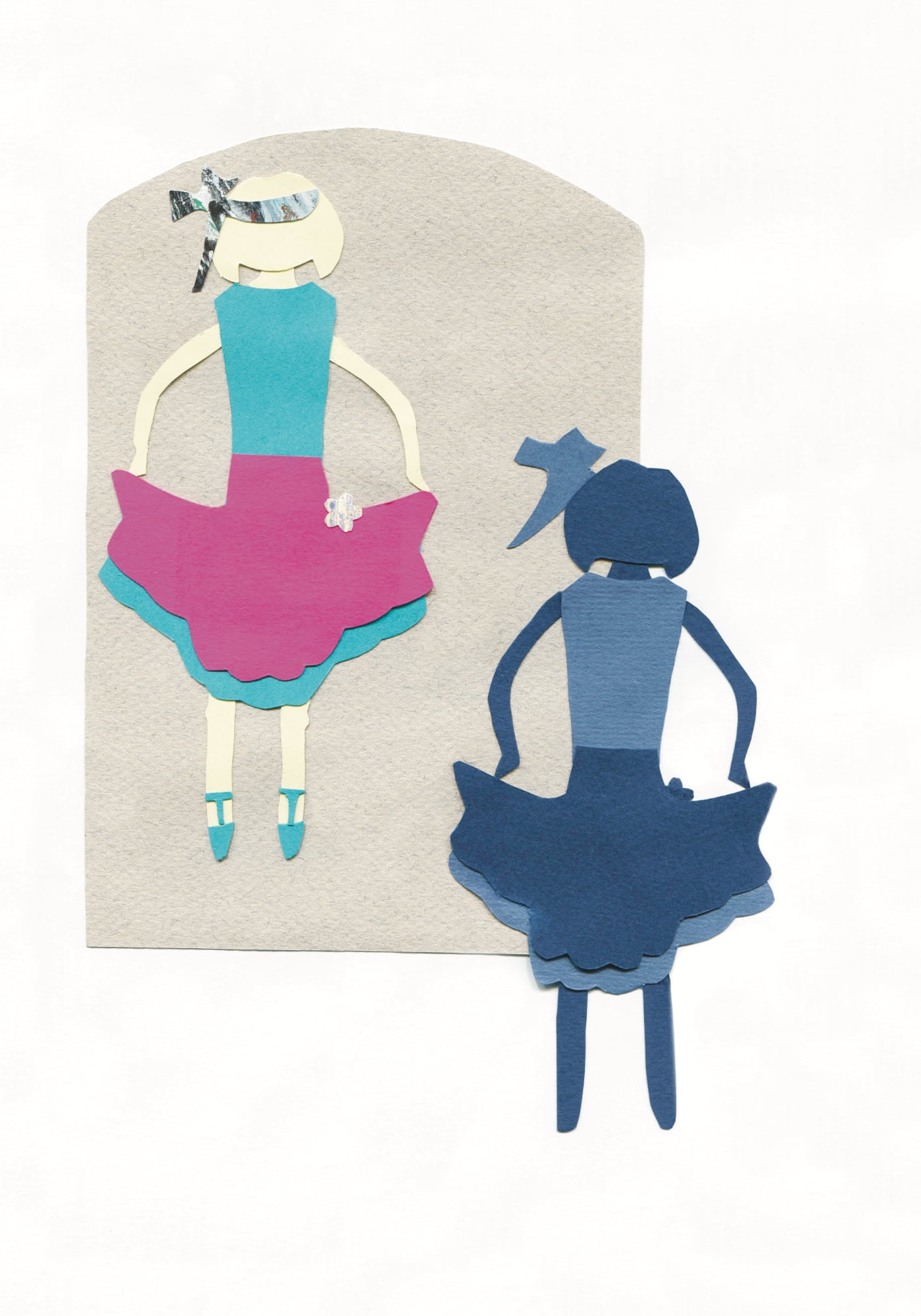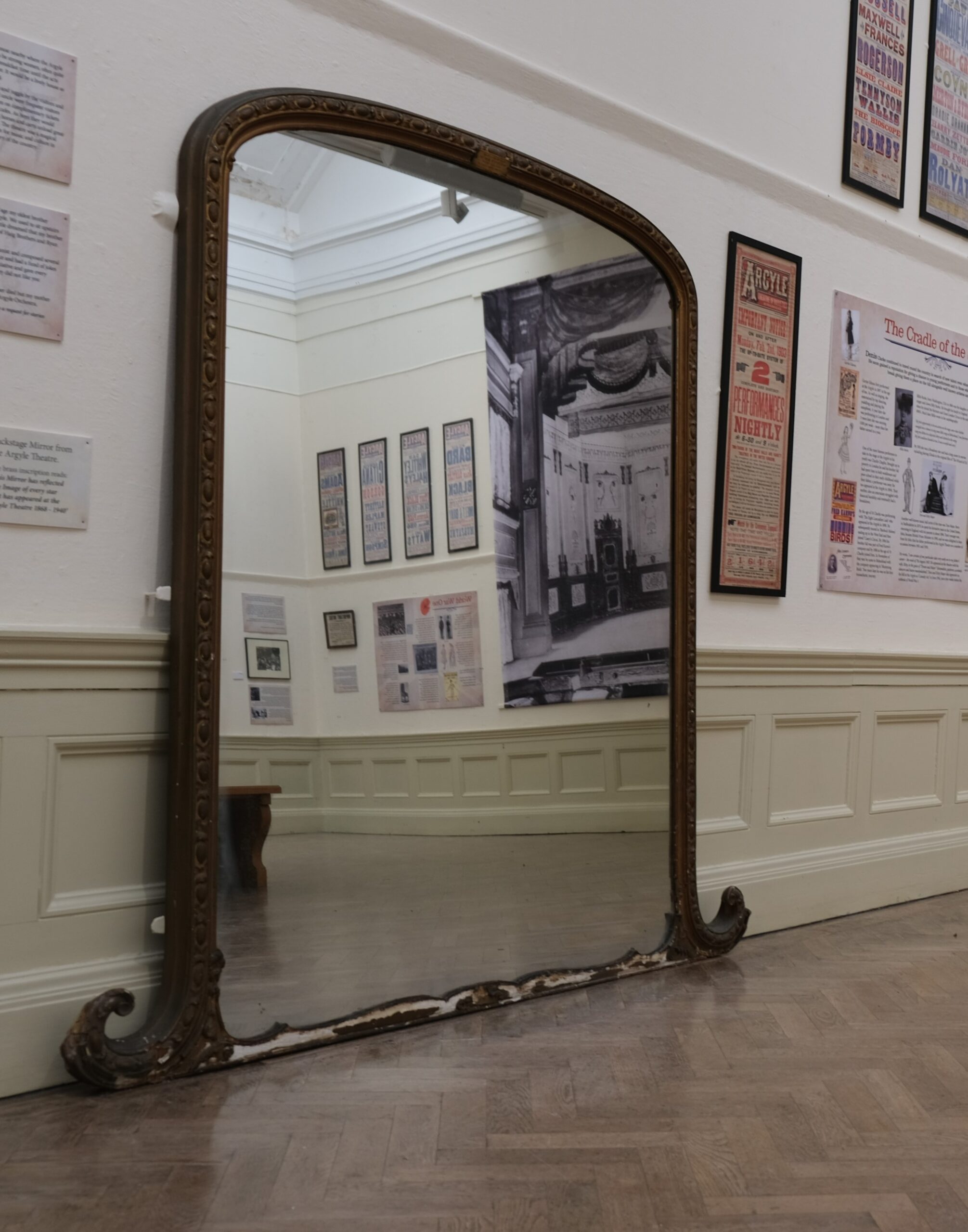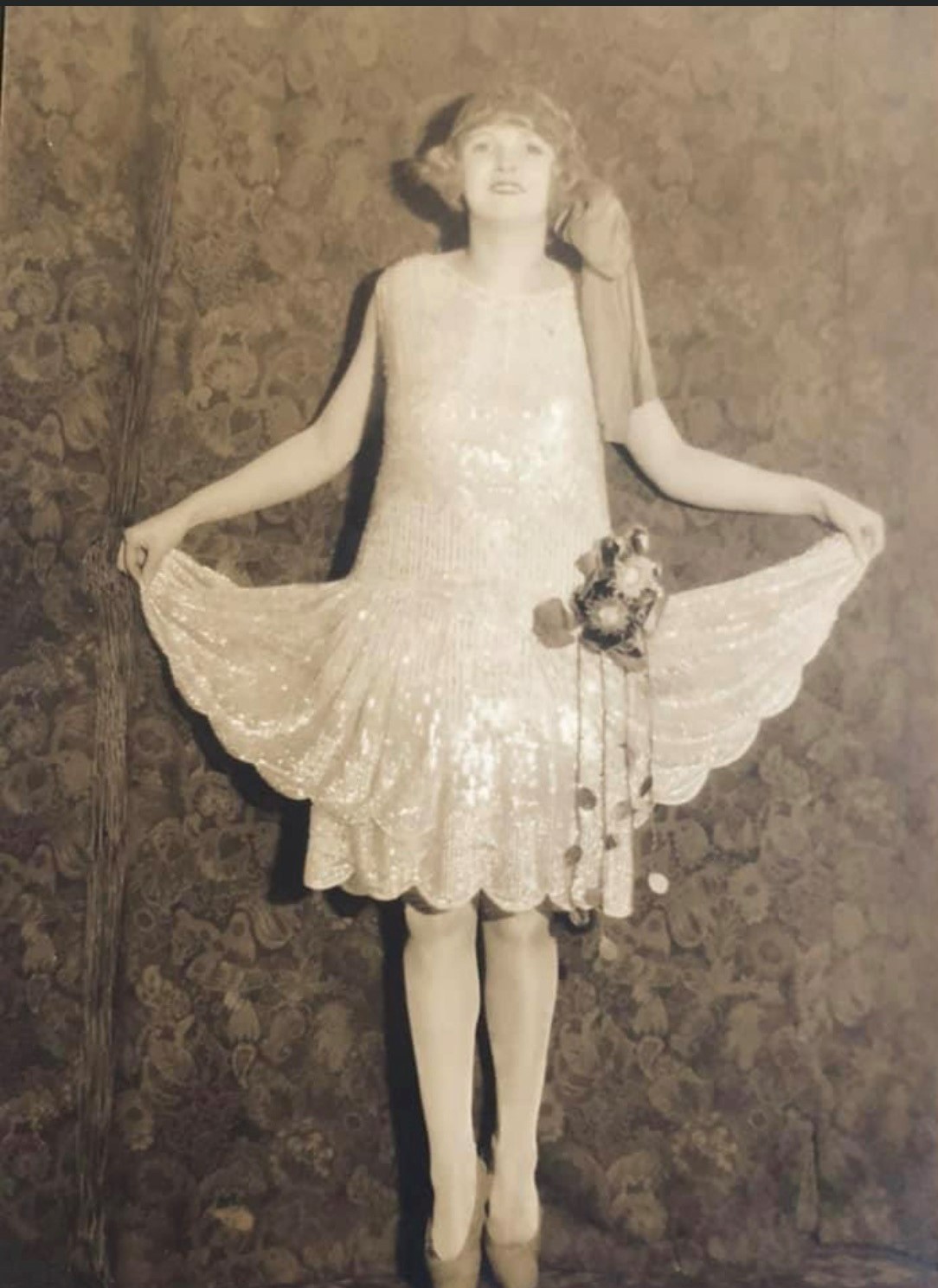Belinda Ludlow
The mirror in question is huge: I can stand before it and there would still be space beside me for the reflection of another; at three feet wide and six feet high, it can give you at once an impression of grandness and reassurance, and yet equally make you feel insecure and even, at times, somewhat morose. This imposing structure sits at the right hand entrance to the stage at The Argyle Theatre, Birkenhead, and each time I gaze into it, I am fully aware of whose reflections have appeared within its glass before me: Charlie Chaplin and Houdini. It is 1926 and the twice nightly variety performances at our very popular theatre mean that the mirror would be able to tell many tales, if only it could speak.
Some in my dance troupe have stopped looking into their reflections as it makes them feel intimidated, especially as they have already harnessed the excitement and team spirit from their friends in the dressing room, before mounting the stairs to the side of the stage. Yet, here I am. At the final few moments before the orchestra strikes the first chord, which is our cue, I check my appearance before the orchestra starts. I love the liberty of the Charleston ‘flapper’ style; exotic, bold, different. Checking the angle of my headband and the attached feather, that the T-bars on my shoes are equally distanced, and that my stockings are pulled up tight to the garters, I smile with excitement. I run my hands down my straight, sleeveless dress, the waistline dropped to the hips, and marvel at the shimmer of the sequins across the lilac bodice and the satin trim of the scalloped purple hem. A far cry from my work attire at the soap factory. Wow! Yes, that’s really me. What would my mother say? Ooph! Who cares. Right… that’s the opening note of ‘Baby Face’ here we go…oooh the mirror always smiles back at me. I think it’s enjoying this too.

“Aaaaalice!” She always yells from her armchair in front of the fire in the parlour.
I can’t resist shouting back. “I’ve told you, Mum, I’m Maimie now. It’s a stage name.”
“What’s a ‘stage name’? Your Dad and I looked all the way through one of those baby name books to choose your name. It’s Alice!”
I manage to mumble, “well, you didn’t get very far then, did you? With Alice.” I lean against the stove in the kitchen. “I’m Maimie. It’s sort of based on my middle name: Mabel, though, which you and Dad chose, so, it’s my name now. I chose it. Do you get it? I chose it. It’s my stage name.”
I check myself, realising that I’m behaving in the familiar way I do when faced with confrontation, especially maternal confrontation. Leaning against the stove, I’m ‘hiding’ in the kitchen, rubbing the palm of my left hand with my right thumb, raising my eyes, arms crossed against my body. How can I tell her about the trip?
I walk towards the doorway into the parlour, and lean on the door jamb, still rubbing my palm. Violet, my Mum, is sitting in the armchair next to the fireplace, the cold ashes still in the grate from the previous day’s fire.
“Mum.”
Her face rarely changes: a fixed grimace, piercing hazel eyes. Will she ever look on me with fondness?
I move to sit on the couch opposite her. Mum occupies her throne of the magnificent, padded armchair with plump cushions and jaded silky fabric, the inherited antimacassar almost grey. This chair was a family ‘heirloom’ as my mother would refer to it, but the frame and body were thin, the cushions on the seat and over the arm rests shallow, loose threads from the sateen are well worn, the floral pink hues faded. A bit like its occupant.
With a knot in my stomach I suddenly recall, guiltily, how as a teenager I would bait her with fervour to see how far I could go without inciting retaliation; it was a game I’d regularly win. But age and family deaths had caused me to become somewhat wary. Looking across to her, I note the slivers of silver through her brown hair, tied roughly back in a bun, and her long skirt, a fashion of a bygone era, and lean forward slightly, hoping, yet still rubbing my left palm with my right thumb.
“Mum, there’s going to be a trip. With the dance group. It’s paid for and everything.”
“What? A trip? Well that’s all very well for you, but what about me? You can’t leave me here all on my owneyo.”
“Mum, it’ll only be for a short while. Well, two weeks tops.” I lower my eyes, continuing to rub my palm, where a red mark is starting to form.
“Two weeks? Where are you going in that time? Is it Blackpool? You can’t leave me. Not with my bad legs. How am I going to get the coal from the shed? You can’t leave me, I’m telling you! Not your poor old Mam. Abandoning me in my old age!” She turns her gaze back to the cold fire. She’s forty-nine, going on ninety.
“Mum, you’re not even fifty yet!. That’s no age. C’mon. That polio you had as a child may have made your legs a bit wobbly, but it hasn’t killed you off!”

My mother greets me with a familiar frown and a scowl. Those piercingly accusatory eyes cut me to the quick.
“This is a great opportunity for me. The girls are all excited. This could be our big break.”
“Typical,” she grunts, “same old, same old. Think of yourself. One day you’ll be a Mum and you see then what it’s like.” She turns to look into the fireplace, draws her hands together and wrings them.
“Your Ted wouldn’t have left me.”
My stomach knots. Oh, here we go again. I mouth the words in silence as she utters them; the story of my brother Ted.
“He’d survived the Great War, I’ve still got his uniform, now moth eaten, in the wardrobe, with his medal attached. He’d never got over the horrors he’d seen at war, would wake screaming in the night. But it was the fire that killed him. Right here in his own home.”
How can I ever be allowed to forget it? Retaining his ghost as a familiar friend, the favoured focus of her attention, over her living daughter. A job at the soap factory had given Ted focus during the day. The mechanical processes of the daily routine, the repetitive nature and familiar smells of the shop floor took his mind away from the memories of France. But nobody could have foreseen the accident in the fire. Coming home after a chip supper and having drowned his sorrows at the pub, he’d walked back with me and lay in front of the hearth after stoking the fire, adding more coals. I’d joined him for a swift drink in the pub before closing, after the last show, but had left him in front of the fire and gone to bed. Nobody could have stopped the coal falling from the fire, the embers catching the hearth rug and his clothes as he slept in such a drunken stupor that the smoke and the blaze could not waken him. I can sometimes still smell the smoke wafting upstairs, the smoke that had eventually roused me, by which time it had been too late. Mum always blamed me. I shouldn’t have left him. Mum would never allow me to be considered better than my older dead brother. The hero. She would spend most of every day staring into the fire, harbouring, nurturing the grief so that it engulfed her, pervaded her very existence, became her. Violet Hind clung to those memories as to a sunken anchor.
Something gives in this moment; something evaporates into the ether. Somehow, I realise that my life is about to change, that the next step could be a moving away from the familiar into the unknown, to uncertainty; it could have irreversible implications. I’m not sure I have the courage. Mother clings to past griefs as to that anchor that pulls her down, the anchor that is readily available, just a thought’s stretch away: she can yank hold of it and relive the pain, the ‘what ifs’, the ‘who’s to blame?’ But it is also a restraining chain with links made from silver tears, ever coursing down, down, into the creases of her face.
“You should be married by now. Twenty Six! You should be changing nappies, not ironing your hair.”
“I can’t win, can I? One minute you want me married off, the next you’re moaning about me going away for two weeks.”
Then, resigned, she mumbles, “well you can bring me back a stick of rock or summat.”
“Mum, I don’t they’ll have sticks of rock in Milan. It’s not Blackpool, you know. But I’ll think of something.”
“Milan? Why Milan?”
“Mrs Lewis, our group leader, has got some connections. And the governments want to make some arty links, with dance and music and that. I don’t really know any more. But the trip is free and we get accommodation and some pay.”
“Sounds very exotic. I went to Scotland once. But you’d better watch yerself. Them foreigners! There’s been a war you know. It was them foreigners that finished off your Dad.”
“We’ll be at the theatre nearly all day and staying in a hostel all together every night after the show. And I’ve arranged with Aunty May and Uncle Frank to come across the street to help you out. Frank will bring in the coal.”
Tonight, after the two evening shows, I go for a stroll with Eric again, to our favourite place: the Mersey waterfront at Woodside Ferry. At just ten minutes’ walk from the theatre, it feels like we are on holiday. We both still live with parents, but we’ve been stepping out for a few months now. He’s a juggler in the variety show; tall, slender, with the ubiquitous long arms, he has dark hair which shines in the moonlight and green eyes which take my breath away.
Our legs dangle over the edge of the jetty and he takes my hand, then raises the other to stroke my cheek. He starts to sing softly.
“Yes, sir, that’s my baby. No, sir, don’t mean maybe. Yes, sir, that’s my baby now.” His palm caresses my cheek. He’s so adorable.
“Aw you’re so sweet. That’s beautiful,” I manage to whisper.
“You’re off to Milan then? Well, get you, madam! No jugglers allowed, eh? Shame!”
The pearly orb in the sky shimmers coldly across the surface of the Mersey.
“Can’t pass up this chance. It’ll be like a free holiday. Girls just having fun.”
His eyebrows rise.
“Well, a bit of gossip for you,” I try to change the subject. ‘Nathalie can’t go. Seems that after her trip to Blackpool with Tom, she’s come back with more than a stick of rock. Mrs Lewis noticed that she was thickening around the waist and said she ought to get her dress let out. So we’ll have to get a replacement. There’s always more girls waiting in the wings.”
Silence. I continue.

“It’s only June, and we don’t go until September. Still got to sort out passports and all the paperwork yet.”
“Will you come back to me?” He ventures, his smile seeming to have turned upside down.
“Of course! It’s not going to change anything. Bit of an adventure. Once in a lifetime sort of thing.”
“Fancy a trip to Blackpool before that then?”
I can’t help but giggle and fall into his arms.
The next day, as we ascend the staircase from our dressing room, the girls are all pumped up for the first show.
“I hear that the cathedral in Milan is very beautiful,” whispers Edith.
“Ooh. Never mind the ‘duomo’, I’ll be looking at the ‘uomo,” retorts Louise. Laughter inevitably ensues.
Standing in front of the mirror, side of stage, moments later, and drowned out by the opera singer on the stage, I quietly click my fingers, turning to the girls. I start to kick up my legs and they join in a whispered chant-like rhythm, each adding a Milanese reference. ‘Duomo’, ‘uomo’, ‘pasta’, ‘limoncello’, then rhythmically together, “Charleston, da do da do da da da do do oh!”


